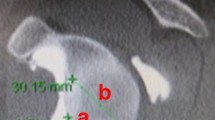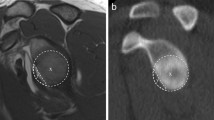Abstract
Objective
To evaluate the intra-observer and interobserver reliability of the ‘Pico’ computed tomography (CT) method of quantifying glenoid bone defects in anterior glenohumeral instability.
Materials and methods
Forty patients with unilateral anterior shoulder instability underwent CT scanning of both shoulders. Images were processed in multiplanar reconstruction (MPR) to provide an en face view of the glenoid. In accordance with the Pico method, a circle was drawn on the inferior part of the healthy glenoid and transferred to the injured glenoid. The surface of the missing part of the circle was measured, and the size of the glenoid bone defect was expressed as a percentage of the entire circle. Each measurement was performed three times by one observer and once by a second observer. Intra-observer and interobserver reliability were analyzed using intraclass correlation coefficients (ICCs), 95% confidence intervals (CIs), and standard errors of measurement (SEMs).
Results
Analysis of intra-observer reliability showed ICC values of 0.94 (95% CI = 0.89–0.96; SEM = 1.1%) for single measurement, and 0.98 (95% CI = 0.96–0.99; SEM = 1.0%) for average measurement. Analysis of interobserver reliability showed ICC values of 0.90 (95% CI = 0.82–0.95; SEM = 1.0%) for single measurement, and 0.95 (95% CI = 0.90–0.97; SEM = 1.0%) for average measurement.
Conclusion
Measurement of glenoid bone defect in anterior shoulder instability can be assessed with the Pico method, based on en face images of the glenoid processed in MPR, with a very good intra-observer and interobserver reliability.


Similar content being viewed by others
References
Lazarus MD, Sidles JA, Harryman DT 2nd, Matsen FA 3rd. Effect of a chondral-labral defect on glenoid concavity and glenohumeral stability: a cadaveric model. J Bone Joint Surg Am. 1996;78:94–102.
Bigliani LU, Newton PM, Steinmann SP, Connor PM, McIlveen SJ. Glenoid rim lesions associated with recurrent anterior dislocation of the shoulder. Am J Sports Med. 1998;26:41–5.
Burkhart SS, Danaceau SM. Articular arc length mismatch as a cause of failed bankart repair. Arthroscopy. 2000;16:740–4.
Itoi E, Lee SB, Berglund LJ, Berge LL, An KN. The effect of a glenoid defect on anteroinferior stability of the shoulder after Bankart repair: a cadaveric study. J Bone Joint Surg Am. 2000;82:35–46.
Gerber C, Nyffeler RW. Classification of glenohumeral joint instability. Clin Orthop. 2002;400:65–78.
Greis PE, Scuderi MG, Mohr A, Bachus KN, Burks RT. Glenohumeral articular contact areas and pressures following labral and osseous injury to the anteroinferior quadrant of the glenoid. J Shoulder Elbow Surg. 2002;11:442–51.
Kim SH, Ha KI, Cho YB, Ryu BD, Oh I. Arthroscopic anterior stabilization of the shoulder. Two to six-year follow-up. J Bone Joint Surg Am. 2003;85:1511–7.
Tauber M, Resch H. Reason for failure after surgical repair of anterior shoulder instability. J Shoulder Elbow Surg. 2004;13:278–85.
Boileau P, Villalba M, Henry JY, Balg F, Ahrens P, Neyton L. Risk factors for recurrence of shoulder instability after arthroscopic Bankart repair. J Bone Joint Surg Am. 2006;88:1755–63.
Balg F, Boileau P. The instability severity index score. A simple pre-operative score to select patients for arthroscopic or open shoulder stabilisation. J Bone Joint Surg Br. 2007;89:1470–7.
Mologne TS, Provencher MT, Menzel KA, Vachon TA, Dewing CB. Arthroscopic stabilization in patients with an inverted pear glenoid. Results in patients with bone loss of the anterior glenoid. Am J Sports Med. 2007;35:1276–83.
Chen AL, Hunt SA, Hawkins RJ, Zuckerman JD. Management of bone loss associated with recurrent anterior glenohumeral instability. Am J Sports Med. 2005;33:912–25.
Bushnell BD, Creighton RA, Herring MM. Bony instability of the shoulder. Arthroscopy. 2008;24:1061–73.
Rowe CR, Patel D, Southmayd WW. The Bankart procedure: a long-term end result study. J Bone Joint Surg Am. 1978;60:1–16.
Pavlov H, Warren RF, Weiss CB Jr. The roentgenographic evaluation of anterior shoulder instability. Clin Orthop. 1985;194:153–8.
Burkhart SS, De Beer JF. Traumatic glenohumeral bone defects and their relationship to failure of arthroscopic Bankart repairs: significance of the inverted-pear glenoid and the humeral engaging Hill-Sachs lesion. Arthroscopy. 2002;16:677–94.
Edwards TB, Boulahia A, Walch G. Radiographic analysis of bone defects in chronic anterior shoulder instability. Arthroscopy. 2003;19:732–9.
Griffith JF, Antonio GE, Tong CW, Ming CK. Anterior shoulder dislocation: quantification of glenoid bone loss with CT. AJR Am J Roentgenol. 2003;180:1423–30.
Sugaya H, Moriishi J, Dohi M, Kon Y, Tsuchiya A. Glenoid rim morphology in recurrent anterior glenohumeral instability. J Bone Joint Surg Am. 2003;85:878–84.
Griffith JF, Yung PS, Antonio GE, Tsang PH, Ahuja AT, Chan KM. CT compared with arthroscopy in quantifying glenoid bone loss. AJR Am J Roentgenol. 2007;189:1490–3.
Griffith JF, Antonio GE, Yung PS, Wong EM, Yu AB, Ahuja AT, et al. Prevalence, pattern, and spectrum of glenoid bone loss in anterior shoulder dislocation: CT analysis of 218 patients. AJR Am J Roentgenol. 2008;190:1247–54.
Saito H, Itoi E, Sugaya H, Minagawa H, Yamamoto N, Tuoheti Y. Location of the glenoid defect in shoulders with recurrent anterior dislocation. Am J Sports Med. 2005;33:889–93.
Itoi E, Lee SB, Amrami KK, Wenger DE, An KN. Quantitative assessment of classic anteroinferior bony Bankart lesions by radiography and computed tomography. Am J Sports Med. 2003;31:112–8.
Huijsmans PE, Haen PS, Kidd M, Dhert WJ, van der Hulst VP, Willems WJ. Quantification of a glenoid defect with three-dimensional computed tomography and magnetic resonance imaging: a cadaveric study. J Shoulder Elbow Surg. 2007;16:803–9.
Barchilon VS, Kotz E, Barchilon Ben-Av M, Glazer E, Nyska M. A simple method for quantitative evaluation of the missing area of the anterior glenoid in anterior instability of the glenohumeral joint. Skeletal Radiol. 2008;37:731–6.
Chuang TY, Adams CR, Burkhart SS. Use of preoperative three-dimensional computed tomography to quantify glenoid bone loss in shoulder instability. Arthroscopy. 2008;24:376–82.
Baudi P, Righi P, Bolognesi D, Rivetta S, Rossi Urtoler E, Guicciardi N, et al. How to identify and calculate glenoid bone deficit. Chir Organi Mov. 2005;90:145–52.
Walter SD, Eliasziw M, Donner A. Sample size and optimal designs for reliability studies. Stat Med. 1998;17:101–10.
Altman DG, Schulz KF, Moher D, Egger M, Davidoff F, Elbourne D, et al. The revised CONSORT statement for reporting randomized trials: explanation and elaboration. Ann Intern Med. 2001;134:663–94.
Nobuhara K. The shoulder: its function and clinical aspects. Singapore: World Scientific; 2003.
De Wilde LF, Berghs BM, Audenaert E, Sys G, Van Maele GO, Barbaix E. About the variability of the shape of the glenoid cavity. Surg Radiol Anat. 2004;26:54–9.
Aigner F, Longato S, Fritsch H, Kralinger F. Anatomical considerations regarding the "bare spot" of the glenoid cavity. Surg Radiol Anat. 2004;26:308–11.
Kralinger F, Aigner F, Longato S, Rieger M, Wambacher M. Is the bare spot a consistent landmark for shoulder arthroscopy? A study of 20 embalmed glenoids with 3-dimensional computed tomographic reconstruction. Arthroscopy. 2006;22:428–32.
Huysmans PE, Haen PS, Kidd M, Dhert WJ, Willems JW. The shape of the inferior part of the glenoid: a cadaveric study. J Shoulder Elbow Surg. 2006;15:759–63.
Provencher MT, Detterline AJ, Ghodadra N, Romeo AA, Bach BR Jr, Cole BJ, et al. Measurement of glenoid bone loss: a comparison of measurement error between 45° and 0° bone loss models and with different posterior arthroscopy portal locations. Am J Sports Med. 2008;36:1132–8.
Jeske HC, Oberthaler M, Klingensmith M, Dallapozza C, Smekal V, Wambacher M, et al. Normal glenoid rim anatomy and the reliability of shoulder instability measurements based on intrasite correlation. Surg Radiol Anat. 2009; Mar 28. doi:https://doi.org/10.1007/s00276-009-0492-0
Author information
Authors and Affiliations
Corresponding author
Rights and permissions
About this article
Cite this article
Magarelli, N., Milano, G., Sergio, P. et al. Intra-observer and interobserver reliability of the ‘Pico’ computed tomography method for quantification of glenoid bone defect in anterior shoulder instability. Skeletal Radiol 38, 1071–1075 (2009). https://doi.org/10.1007/s00256-009-0719-5
Received:
Revised:
Accepted:
Published:
Issue Date:
DOI: https://doi.org/10.1007/s00256-009-0719-5




